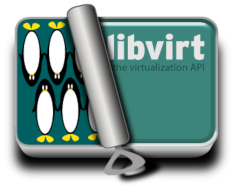QEMU
QEMU  is a generic and open source machine emulator and virtualizer.
When used as an emulator, QEMU can run OSes and programs made
for one machine (e.g. an ARM board) on a different machine (e.g. your
own x86_64 PC). When used as a virtualizer, QEMU achieves near native
performance by executing the guest code directly on the host CPU
using KVM.
is a generic and open source machine emulator and virtualizer.
When used as an emulator, QEMU can run OSes and programs made
for one machine (e.g. an ARM board) on a different machine (e.g. your
own x86_64 PC). When used as a virtualizer, QEMU achieves near native
performance by executing the guest code directly on the host CPU
using KVM.
KVM
KVM  (for Kernel-based Virtual Machine) is a full virtualization
solution for Linux on hardware containing virtualization extensions.
It consists of a loadable kernel module that exposes virtualization
APIs to userspace for use by applications such as QEMU.
(for Kernel-based Virtual Machine) is a full virtualization
solution for Linux on hardware containing virtualization extensions.
It consists of a loadable kernel module that exposes virtualization
APIs to userspace for use by applications such as QEMU.
Libvirt
libvirt  is a library and daemon providing a stable open source API for
managing virtualization hosts. It targets multiple hypervisors
including QEMU, KVM, LXC, Xen, OpenVZ, VMWare ESX, VirtualBox
and more.
is a library and daemon providing a stable open source API for
managing virtualization hosts. It targets multiple hypervisors
including QEMU, KVM, LXC, Xen, OpenVZ, VMWare ESX, VirtualBox
and more.
Libguestfs
libguestfs  is a set of tools for accessing and modifying virtual
machine (VM) disk images. You can use this for viewing and editing
files inside guests, scripting changes to VMs, monitoring disk used
/ free statistics, creating guests, P2V, V2V, performing backups,
cloning VMs, building VMs, formatting disks, resizing disks, and
much more.
is a set of tools for accessing and modifying virtual
machine (VM) disk images. You can use this for viewing and editing
files inside guests, scripting changes to VMs, monitoring disk used
/ free statistics, creating guests, P2V, V2V, performing backups,
cloning VMs, building VMs, formatting disks, resizing disks, and
much more.
virt-manager
virt-manager  is a desktop user interface for managing virtual machines
through libvirt. It primarily targets KVM VMs, but also manages Xen and LXC.
It also includes the command line provisioning tool virt-install.
is a desktop user interface for managing virtual machines
through libvirt. It primarily targets KVM VMs, but also manages Xen and LXC.
It also includes the command line provisioning tool virt-install.
libosinfo
libosinfo  provides a database of information about operating
system releases to assist in optimally configuring hardware
when deploying virtual machines. It includes a C library for
querying information in the database, which is also accessible
from any language supported by GObject Introspection.
provides a database of information about operating
system releases to assist in optimally configuring hardware
when deploying virtual machines. It includes a C library for
querying information in the database, which is also accessible
from any language supported by GObject Introspection.